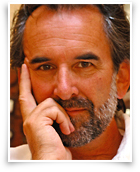
Richard Harvey
connecting psychotherapy and spiritual growth for human awakening
Natural Health: Richard Harvey talks to Paul Blake
Last month in this column Exeter psychotherapist Richard Harvey wrote an article on therapy and politics. I liked the article and considered the issues that were raised so important that I decided to do a follow-up interview with Richard, so that we could explore some of these matters in more depth. What follows is an edited extract from a much longer discussion.
Paul: What do your ideas about therapy and politics actually mean in practice? If a National Front member came to you, would you challenge his politics?
Richard: That’s a strange question—it’s never happened to me or any other therapist I know! But I’d treat politics just like anything else. I’d try to ask the kind of questions that would promote greater awareness. I certainly don’t ignore the political dimension in therapy. On the other hand it’s not my job to try to change people’s ideas by arguing with them.
P: Do you think that the work you do—in groups for example—can contribute to solving social problems?
R: You can’t quantify success or failure in the inner realms, but I am sure that we should be doing this kind of work anyway. Any place where we can look at how we relate to other people is good. You ask me about the relationship between psychotherapy and the world outside. Well, I’ve just come back from a five-day meditation retreat and when I left I heard about the events in the Gulf for the first time. Now, you can look at this in Jungian terms; the relations between the great powers have improved, but the shadow has to emerge somewhere else. What we can all do is look at the part of ourselves that is in the shadows.
P: I’m interested in the question of the legitimate power of the therapist—a political matter if ever there was one! Let me pose a dilemma that I know is real. A client starts crying about a recent event and then says that it was something that happened in a past life. Do you let them explore that, or do you insist that they stay in the present life?
R: In general I would follow the client. But if it was someone I knew well and I was aware that they always cut off into past lives when anything painful came up, I would point that out and give them the opportunity to look at what they were avoiding. But I’d have to be pretty confident about my relationship with them to do that.
P: What are your main interests at the moment?
R: My pet subject at the moment is male energy. I can quite understand why there’s a tendency to negate this—to put it crudely, we’ve had several thousand years of patriarchy and we’ve ballsed it up—but male energy needn’t be destructive. It’s likely to become so if it’s repressed in fact. We need to own it and affirm it.
P: Is male energy just another name for aggression?
R: No. Aggression is an expression of energy, male energy included, but that’s by no means the whole story. I sometimes think of it as like the sea, which can be destructive. But it is so much else as well. It’s a question of the use of energy—how we use it—and of being in touch with it, not repressing and perverting it.
P: There seems to be some kind of general crisis of sexual relations going on at the moment.
R: Yes, It’s got many aspects. For example, I think there are a great number of men who are out of touch with their male energy and turning their wives into mothers. And many women are ready to carry out the mothering role. Again I can see how this kind of thing has happened and I think that facing up to some of these issues might help.
P: I never thought that the way some men reacted to the Women’s Movement, with total self-contempt, was very helpful—to them or to the women.
R: But that was my first reaction! I suppose I was quite ignorant about male oppression until I opened up to Mary Daly, Andrea Dworkin and some of the other feminist writers. Then I took it all on board at once and the result was I felt a huge amount of guilt.
P: Is male energy the centre of your therapeutic wok at the moment?
R: Like most therapists I find that the majority of people who come to me are women! I would definitely like to work on these issues with more men.
P: Thank you for speaking with us Richard.
R: It has been my pleasure. Thank you.
Share this article
This article was published in Exeter Flying Post, No 209, 1990.